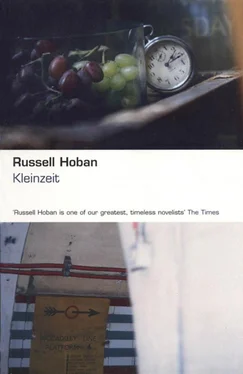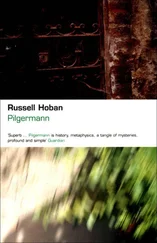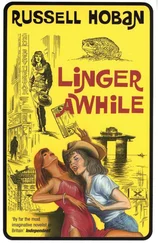Russell Hoban - Kleinzeit
Здесь есть возможность читать онлайн «Russell Hoban - Kleinzeit» весь текст электронной книги совершенно бесплатно (целиком полную версию без сокращений). В некоторых случаях можно слушать аудио, скачать через торрент в формате fb2 и присутствует краткое содержание. Год выпуска: 2002, Издательство: Bloomsbury, Жанр: Современная проза, на английском языке. Описание произведения, (предисловие) а так же отзывы посетителей доступны на портале библиотеки ЛибКат.
- Название:Kleinzeit
- Автор:
- Издательство:Bloomsbury
- Жанр:
- Год:2002
- ISBN:нет данных
- Рейтинг книги:4 / 5. Голосов: 1
-
Избранное:Добавить в избранное
- Отзывы:
-
Ваша оценка:
- 80
- 1
- 2
- 3
- 4
- 5
Kleinzeit: краткое содержание, описание и аннотация
Предлагаем к чтению аннотацию, описание, краткое содержание или предисловие (зависит от того, что написал сам автор книги «Kleinzeit»). Если вы не нашли необходимую информацию о книге — напишите в комментариях, мы постараемся отыскать её.
The Peloponnesian War
Kleinzeit — читать онлайн бесплатно полную книгу (весь текст) целиком
Ниже представлен текст книги, разбитый по страницам. Система сохранения места последней прочитанной страницы, позволяет с удобством читать онлайн бесплатно книгу «Kleinzeit», без необходимости каждый раз заново искать на чём Вы остановились. Поставьте закладку, и сможете в любой момент перейти на страницу, на которой закончили чтение.
Интервал:
Закладка:
Where there’s no losing there’s no winning, said Kleinzeit.
Sophistry, said Hospital. The simple fact is that all I do is win. Have you remembered yourself?
I’m doing it, said Kleinzeit. Little by little.
Remains to be seen, said Hospital.
Remains to be remembered, said Kleinzeit.
The Machine from the God
Under the yellow plastic Ryman bag that was its cover the yellow paper growled softly. Lover, come back to me, it whispered. It was so good, so good that last time when you took me while I was sleeping. Where are you?
He’s not here today, said Word. I am.
Not you, whimpered the yellow paper. Not the enormity of you. No, no, please, you’re hurting me. O my God the awful tremendousness of you, you, you, you …
Like thunder and lighting the seed of Word jetted into the yellow paper. Now, said Word, there you are. I’ve quickened you. Let them die in their hundreds and their thousands, from time to time one of them must wiggle through. I see to that.
The yellow paper was weeping quietly. He wanted … He wanted … it sobbed.
Yes, said Word. He wanted?
He wanted to be the only one, he wanted to do it all himself.
Nobody does it all himself, said Word. Nobody does it unless I have shot my seed as well. Barrow full of rocks and all that.
What? said the yellow paper. What barrow full of rocks, harrow full of crocks, arrow in a box? What is that?
Something that passes through the cosmos of me now and then, said Word. One of myriad flashes, nothing special, faster than the speed of light they come and go. What did I say, my mind is elsewhere.
Barrow full of rocks, said the yellow paper.
Yes, said Word. My mind is full of every kind of nonsense. Something like the way odd tunes and scraps of things get into human minds and sing themselves over and over again, but vastly faster.
Barrow full of rocks? said the yellow paper.
That’s just my name for it, said Word. A pneumatic.
Mnemonic, said the yellow paper.
Whatever you like, said Word. The line itself is by Pilkins.
Milton? said the yellow paper.
Something like that, said Word. ‘Hidden soul of harmony’ is what he said. I like that. It sings. ‘Untwisting all the chains that ty /The hidden soul of harmony.’ That’s nice. I’ll think of it again some time.
Do you mean to tell me, said the yellow paper, that ‘Barrow full of rocks’ is nothing more than a mnemonic for ‘Hidden soul of harmony’?
Precisely, said Word.
That’s outrageous, said the yellow paper. And on top of that they’re nothing like each other.
Of course not, said Word. If the mnemonic is the same as what it reminds you of why bother with it. I don’t even like them to be too close. If you have a nice thing to think about you don’t want to keep it out in plain view all the time, you know, with the virtue getting rubbed off it. Keep it dark is what I say.
The whole thing’s quite beyond me, said the yellow paper.
Of course it is, said Word. Beyond me too, and roundabout as well.
But your wretched barrow full of rocks has got into human minds, said the yellow paper. Your miserable mnemonic, not even the thing it refers to. For a flash through your mind, for an odd tune come and gone like lightning, men suffer and die riddling where there is no riddle, digging where there is no treasure.
Why not, said Word. That’s what men are for. From time to time, as I said, I see to it that one wiggles through.
Kleinzeit? said the yellow paper.
I don’t know what his name is, said Word, and I don’t care. Whoever it is that writes on you, let him get on with it. It’s in you now.
But is that, you know, artistically right? said the yellow paper. Isn’t it sort of the god from the machine?
Don’t be ridiculous, said Word. The machine, whether typewriter or Japanese pen, is from the god. Where else could it be from.
You’re a god then? said the yellow paper.
I employ gods, said Word, and left.
Kleinzeit mustn’t know what happened, whispered the yellow paper. I’ll never tell him. Lover, come back to me.
Getaway
Morning. Cold. Low white winter sun. White exhaust from passing cars whirling tightly in the chill. People on the pavements blowing white clouds of breath. Action walking past the hospital, cigarette in his mouth, hands in his pockets. He didn’t look up. When he reached the corner he turned, walked back again, looked up at the hospital.
On the second floor the A4 fire-exit door opened, two Pain Company scouts came out, weapons at the ready. They stood at the head of the old iron stairs, looked down, scanned the street.
Action whistled, the scouts whistled back. The rest of Pain Company came out, some of them supporting Kleinzeit, one of them carrying his case, the others guarding his rear. Kleinzeit, dressed for the street, was very pale.
Very slowly they came down the stairs, crossed the forecourt, reached the pavement. The traffic lights at the corner changed to green, a taxi pulled up. FOR HIRE. Action hailed it.
Kleinzeit turned, looked back at the fire-exit door. A small black figure came out, came hopping, swinging down the iron stairs, swinging across the forecourt. Action opened the taxi door, threw in Kleinzeit’s case. Kleinzeit got in, Death jumped in beside him, then Action. The taxi pulled away. Pain Company doubled back to the hospital car-park. One by one their motorcycles roared in the cold, one by one they wheeled out into the traffic, roared off towards Kleinzeit’s place.
Eurydice Looked Ahead
Pain Company put Kleinzeit to bed, rang up Sister, left. Death made itself comfortable at Kleinzeit’s feet.
You’re housebroken, I suppose, said Kleinzeit.
Death grinned, nodded, touched its forelock, went to sleep.
Kleinzeit closed his eyes, saw in his mind the plain deal table and the yellow paper. He felt that there was at the same time a great deal to think about and nothing to think about. He chose to think about nothing. It was difficult. Behind nothing danced yellow paper, ordinary foolscap, Rizla. Word rumbled, Hospital roared. He was too tired to understand what they said.
Easy does it, said Nothing. Lean on me, let it all slide by. Kleinzeit leaned on Nothing, fell asleep.
Sister arrived with an electric fire, groceries, wine, Zonk, Greenlite, fruity buns. Kleinzeit woke up to find her sitting on the floor beside his mattress looking at him.
‘Hero,’ said Sister. ‘Idiot hero.’
‘Not such an idiot,’ said Kleinzeit. ‘That hospital’s not safe. They’re hell-bent on taking out my insides.’
‘Nowhere’s safe,’ said Sister.
‘But it’s hard to stay nowhere,’ said Kleinzeit.
Sister made lunch. They ate, drank wine.
‘Eurydice,’ said Sister.
‘Why’d you say that?’ said Kleinzeit.
‘It came into my mind,’ said Sister. ‘In the story Orpheus looked back and lost Eurydice, but I don’t think that’s how it was. I think Eurydice looked ahead and lost Orpheus. I don’t think Eurydice should’ve looked ahead.’
‘Well,’ said Kleinzeit. He wanted to tell Sister what he knew about Orpheus, but all he could think of was the blind head swimming towards Thrace, swimming at night across the ocean with the moonlight on it. All the rest seemed too detailed. ‘Well,’ he said, shook his head, was silent.
They had coffee, fruity buns.
‘I can’t get it out of my mind,’ said Sister. ‘I see them coming out of the Underworld, Orpheus leading Eurydice by the hand and Eurydice wondering how it’s going to be now, wondering if anything can ever be the same. She keeps asking Orpheus how will it be, and Orpheus says he doesn’t know but she keeps asking. Finally he says Oh what the hell, let’s forget it.’
Читать дальшеИнтервал:
Закладка:
Похожие книги на «Kleinzeit»
Представляем Вашему вниманию похожие книги на «Kleinzeit» списком для выбора. Мы отобрали схожую по названию и смыслу литературу в надежде предоставить читателям больше вариантов отыскать новые, интересные, ещё непрочитанные произведения.
Обсуждение, отзывы о книге «Kleinzeit» и просто собственные мнения читателей. Оставьте ваши комментарии, напишите, что Вы думаете о произведении, его смысле или главных героях. Укажите что конкретно понравилось, а что нет, и почему Вы так считаете.












